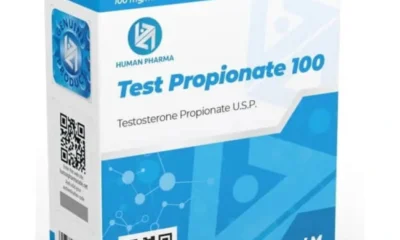Lifestyle
How to Dispose Of Household Hazardous Waste (HHW) Responsibly?
One thing that most households have in common is the accumulation of Household Hazardous Waste (HHW). It seems they cannot help but accumulate things such as cans of old paint, tins of gasoline, worn-out batteries, and whatnot.

While you may not realize but it is important to dispose of them in the most suitable way that does not pose a threat to the environment. You must remember that they are not your regular household waste. So, before you decide to hire a junk removal company in London, know everything you need to.
Disposing of these household hazardous wastes is not easy. In the first place, you may not be entirely sure if you need to call a hazardous waste collection company. Sometimes, people also wonder if some of these hazardous items are recyclable or reusable.
But before we delve deep into the ways suitable for this type of hazardous waste disposal, let us explore its definition first.
What is Household Hazardous Waste?
Any waste that poses possible threats to public health or the environment is what we call hazardous waste. According to law, it needs special care to ensure safe disposal.
HHW exhibits the following features:
- Corrosivity
There are certain household wastes that exhibit corrosive characteristics of substances. Some examples of such corrosive items include industrial-strength cleaners containing strong acids (hydrochloric or sulfuric acid). Car batteries come under this category that contain sulfuric acid.
- Ignitability
If a particular item possesses flammable characteristics, it becomes hazardous. Common household items that are ignitable include oxidizers, gasoline, propane tanks, and more.
- Reactivity
Any waste that is potentially combustible if mixed together with other substances or exposed to higher temperatures are reactive waste. For example, filled or partially filled aerosol cans, which when exposed to high temperatures can lead to an explosion.
- Toxicity
Toxic wastes are those that contain substances that, if inhaled or consumed can have serious, or deadly, and lead to major health consequences.
Now that you have a general understanding of what features hazardous wastes usually have, let us walk you through the ways for their disposal.
Methods for Household Hazardous Waste Disposal
Dispose of HHW in regular garbage if your local laws permit
Well, this method of disposal is allowed in certain areas, while others do not permit the same. For instance, aerosol sprays are hazardous, however, many areas allow households to toss empty aerosol cans into the garbage.
However, if you want to empty the can before throwing it away, make sure you are very careful with the step. Follow the specific steps and rules for recycling aerosol cans.
[H3] What about asbestos? Waste management contractors are your lifesaver
Asbestos removal could be dangerous. This is why many hazardous waste collection facilities do not accept these items. So, it is better to contact an asbestos contractor beforehand to know if they can dispose of it properly.
Recycle is key – do it as much as you can with your hazardous waste
Recycling hazardous waste including batteries or other electronics parts means you are participating in the welfare of the Earth. This also means your carbon footprint is minimal and you do not pose a threat to the humankind.
Old engine oils, and lead-acid batteries are hazardous items that households should recycle. It is imperative for homeowners to dispose of these items in the most suitable way, ensuring state laws are adhered to.
Items like mercury are also recyclable. Therefore, storing mercury carefully in an air-tight container before disposal is a must.
Reuse items, of course if you can
A great alternative and more eco-friendly option to dispose of HHW is to reuse. This is because it contributes to reducing carbon footprint. For instance, you can consider reusing solvents with paint thinners by closing the container entirely and then enabling the paint to settle to the bottom of the container. Now the solvent is ideal for reuse. Once you are at this stage, let the sludge dry out first. Then discard it.
You can also reuse the containers of paints. For instance, you can repaint the fully dried-out cans to reuse them as pots for plants and other decorative items.
Share or donate, if possible
There is no more effective way to manage hazardous waste than sharing or donating them. By doing so, you can prevent items like fertilizers, auto oil, paint, or acids from wasting. If you feel the items are no longer suitable for use or you have extra, consider giving them away to those who find them useful.
You can offer donations to entities such as schools, homeless shelters, community centers, charities, local businesses, churches, and more.
Dilute hazardous waste instead of disposing them of
While this may sound simple, you need to be extra cautions with this. You need to follow specific guidelines to ensure safety. If done correctly, dilution is an excellent way to increase the use of household hazardous waste by either diluting them with the same material or with water while safely storing the additional amount for future applications.
You can dilute the following HHW items:
- Gasoline: Dilute 1 part of old gasoline to 5 parts of new gasoline. Store the mixture in an air-tight container. Label it properly. Make sure you store it in a cool and dry place away, where there are no moisture, high temperatures, pets, or children.
- Antifreeze: Get your hands on a clean, 1-gallon size container. Make sure it has a tight and secure seal. Then pour half gallon of antifreeze into a one-gallon size container. Mix half gallon of antifreeze with distilled water. Make sure it has 50% antifreeze and 50% distilled water mixed.
Close the lids of the leftover antifreeze and the diluted antifreeze securely. Store additional antifreeze in a place that is safe, away from pets or children.
If you live in a place with colder climates, consider using a higher percentage of antifreeze. This is to protect against low temperatures.
A word of caution: Never use this method if the wastewater goes to a septic tank or cesspool. This is because it has the potential to affect these systems, while damaging groundwater to a great extent. Ensure that you only dilute antifreeze if your house is connected to a sewer.
Never mix different types of chemicals because it could lead to serious consequences.
Check what your local gas station accepts
Gas stations, sometimes, accept various types of automotive waste including brake fluid, transmission fluid, or diesel fuel. When taking your automobile waste to such facilities, however, make sure you do not mix the products with motor oil. This can cause a dangerous situation that you do not want to be in.
To conclude
This is not to deny that hazardous waste has become a worldwide public health and environmental concern. So, it is vital to determine what items you are disposing of, how much of it you want to dispose of, how to store it before disposal, how to treat the same, and how to transport it.
Most people choose to dispose of hazardous waste by collaborating with an HHW collection facility. They have the knowledge, expertise, and equipment to make sure the waste is disposed of properly. Some people often prefer partnering with a local waste collector to ensure environmental and public safety.
Lifestyle
Caitlyn Melissa Murray: Rising Star with Her Own Shine

In today’s world, it’s not easy to stand out and make your mark. Yet Caitlyn Melissa Murray has done just that. With her infectious enthusiasm and undeniable charisma, this rising star is capturing the attention of many.
Her story is one of talent, perseverance, and a sprinkle of that special something that makes you sit up and take notice. If you haven’t heard of Caitlyn yet, you soon will.
This blog aims to introduce you to Caitlyn’s world, exploring her path to stardom and why she’s become a name to watch. Whether you’re a fan, a fellow dreamer, or simply curious, there’s something in Caitlyn’s story for everyone.
The Early Days of Caitlyn
Every star has a beginning, and Caitlyn’s was filled with promise from the start. Growing up, she was the kind of child who lit up any room she walked into. Her family noticed her flair for the dramatic and her love for performing early on. It wasn’t long before Caitlyn was captivating audiences in local theatre productions, making waves as a young talent.
Caitlyn’s passion for performing wasn’t just a passing phase. Unlike many childhood interests, hers only grew stronger with time. Fuelled by her family’s support, she pursued acting, singing, and dancing with dedication. Her talent was unmistakable, and those around her could see that Caitlyn was destined for something special.
But what truly set Caitlyn apart was her unwavering determination. She wasn’t just relying on natural talent; she was putting in the hard work. Long hours of practice, learning, and refining her craft laid the foundation for what was to come. This commitment has been a vital part of her rise as a star.
Finding Her Footing in the Industry
Breaking into the entertainment industry is no small feat, but Caitlyn approached it with the same zest that characterized her early years. She tackled the challenges with grace, always keeping an eye on her dreams. Her ability to connect with people shone through, winning her roles and opportunities that many could only dream of.
Her first breakthrough role was a stepping stone into the spotlight, setting the stage for even bigger things. Critics and audiences alike couldn’t help but notice her vibrant energy and the authenticity she brought to her performances. Caitlyn was more than just a fresh face; she was a breath of fresh air in a competitive field.
Caitlyn’s story is not just about talent but also about resilience. She faced the ups and downs of the industry with courage and learned invaluable lessons along the way. Her ability to adapt and grow with each experience has only made her stronger and more versatile as an artist.
A Style All Her Own
It’s not just Caitlyn’s talents that set her apart; it’s also her distinctive style. She’s not one to follow trends blindly. Instead, she creates her own path, exuding confidence and originality. Her unique fashion choices and her vibrant personality make her a standout, both on and off the screen.
Caitlyn’s style isn’t only about clothes and appearance; it’s about how she carries herself. Her warm and approachable demeanor makes her relatable to fans and peers alike. She’s not afraid to be herself, and that’s something that resonates with many.
Her influence extends beyond just her performances. Caitlyn has become a role model for young people, encouraging them to express themselves freely and authentically. In an age where conformity often rules, Caitlyn’s message of individuality is refreshing and empowering.
The Music and the Magic
For Caitlyn, music has always been a powerful form of expression. Her voice is as captivating as her presence, and she uses it to tell stories that touch the heart. Whether it’s an upbeat tune or a soulful ballad, Caitlyn’s music reflects her passion and her personality.
Her debut album was a testament to her talent, showcasing a range of songs that highlighted her versatility. Each track told a different story, and together, they painted a picture of Caitlyn’s artistic vision. Her music has struck a chord with listeners, further solidifying her place in the spotlight.
The Roles That Define Her
Caitlyn’s acting career is a tapestry of diverse roles that showcase her range and depth as an actress. From dramatic roles that tug at the heartstrings to comedic performances that leave audiences in stitches, Caitlyn has proven that she’s a force to be reckoned with.
Her ability to immerse herself in a character and bring it to life is nothing short of remarkable. Each role is a new challenge, and Caitlyn embraces these opportunities with enthusiasm and dedication. Her performances have earned her accolades and admiration from industry experts and fans alike.
But for Caitlyn, it’s not just about the accolades; it’s about the storytelling. She relishes the chance to explore different narratives and bring them to a wider audience. Her work is a testament to her commitment to her craft and her desire to make a meaningful impact through her art.
A Family That Backs Her
Behind every successful person is a support system, and for Caitlyn, that comes in the form of her family. They’ve been her rock and her biggest cheerleaders from the very beginning. Their love and encouragement have been instrumental in helping Caitlyn pursue her dreams with confidence.
Caitlyn’s family is her anchor, providing stability and support in the whirlwind world of entertainment. They understand the demands of her career and are always there to offer guidance and reassurance. Their unwavering belief in her abilities has helped Caitlyn stay true to herself and her goals.
This close-knit bond has shaped Caitlyn’s values and influenced her approach to life and work. It serves as a reminder of the importance of family and the role they play in our personal and professional journeys. Caitlyn’s story is a testament to the power of love and support in achieving one’s dreams.
Balancing Fame and Normalcy
Rising to fame is no easy feat, and staying grounded is even more challenging. Caitlyn navigates this balance with grace and humility, juggling her career and personal life with aplomb. She’s mindful of the pressures that come with fame and makes a conscious effort to maintain a sense of normalcy.
Her approach to managing fame is simple yet effective. She values her downtime and cherishes moments with family and friends, ensuring that her personal life remains a priority. Caitlyn understands the importance of self-care and takes time to recharge, allowing her to stay focused and energized.
This balance is a crucial part of Caitlyn’s success, enabling her to thrive in the spotlight without losing sight of what truly matters. Her ability to stay grounded amidst the chaos of fame is an inspiration to many, proving that it’s possible to achieve your dreams without losing yourself along the way.
Looking to the Future
The future is bright for Caitlyn Melissa Murray, and her star continues to rise with each new endeavor. Her upcoming projects are eagerly anticipated, promising to bring even more of her magic to fans and audiences worldwide. Whether it’s in music, film, or television, Caitlyn’s future is filled with possibilities.
She’s not one to rest on her laurels; Caitlyn is always looking for new challenges and opportunities to grow as an artist. Her passion for her craft and her desire to make a positive impact drive her forward, ensuring that her influence and reach will only continue to expand.
Caitlyn’s journey is a reminder that success is a combination of talent, hard work, and the courage to follow your dreams. Her story is an inspiration to aspiring artists and dreamers everywhere, proving that with determination and the right mindset, anything is possible.
Final Words
As we wrap up Caitlyn Melissa Murray’s inspiring journey, it’s impossible not to be moved by her unwavering spirit and genuine warmth. Caitlyn’s story is one of talent, tenacity, and an unbreakable bond with her fans and family. She serves as a beacon for anyone daring to dream big, reminding us that with passion, resilience, and a touch of authenticity, the world is ours to discover.
Lifestyle
Mastering the Mollar CGT20750 Drawing Spare Parts for DIY

When it comes to enhancing your DIY projects, having the right tools and spare parts is crucial. The Mollar CGT20750 is a popular choice among hobbyists and professionals alike, renowned for its versatility and reliability. However, like any tool, it requires occasional maintenance and replacement of parts to ensure optimal performance.
This blog post aims to guide you through the ins and outs of Mollar CGT20750 drawing spare parts, helping you keep your projects running smoothly. Whether you’re a seasoned DIYer or a newbie just getting started, this guide will offer valuable insights into the essential spare parts and how to manage them effectively.
Why Spare Parts Matter for Your Mollar CGT20750
Owning a Mollar CGT20750 means you’re equipped with a robust tool designed to tackle a wide range of tasks. But even the best tools require maintenance. Spare parts are vital to keep your tool functioning efficiently and extend its lifespan. Regular replacement of worn-out parts ensures consistent performance and reduces the risk of unexpected breakdowns during your projects.
Neglecting to replace essential parts can lead to decreased efficiency and potential damage to the tool itself. By understanding the importance of spare parts, you can avoid costly repairs and downtime. This preventive approach not only saves you money but also enhances the overall quality of your DIY endeavors.
Investing in quality spare parts means you’re investing in the longevity of your Mollar CGT20750. With the right parts on hand, you can address issues promptly, ensuring that your tool is always ready for action. This proactive strategy allows you to tackle projects confidently, knowing that your equipment is in top-notch condition.
Identifying Key Components of the Mollar CGT20750
To effectively manage your spare parts, it’s crucial to have a clear understanding of the key components of your Mollar CGT20750. Familiarising yourself with these parts will help you identify when replacements are needed and ensure that you always have the right components on hand.
The most commonly replaced parts include the blade, motor brushes, and drive belt. These components experience wear and tear over time and can significantly impact the tool’s performance if not addressed promptly. Regular inspection of these parts helps maintain the tool’s efficiency and prevents unexpected interruptions during your projects.
Additionally, the handle assembly and power cord are vital parts that require attention. A damaged handle can affect your grip and control, while a frayed power cord poses safety risks. By keeping an eye on these components, you can ensure your tool remains safe and functional, ready to tackle any task at hand.
How to Source Quality Spare Parts
Finding reliable sources for your Mollar CGT20750 spare parts is essential for maintaining the tool’s performance and longevity. With numerous options available, it’s important to choose reputable suppliers who offer genuine parts.
Start by checking with the manufacturer or authorized dealers for original spare parts. These sources ensure compatibility and quality, providing peace of mind that you’re investing in reliable components. Additionally, consider online platforms and forums where fellow DIY enthusiasts share recommendations and reviews on trusted suppliers.
When purchasing spare parts, pay attention to product specifications and compatibility with your specific model. Investing in genuine parts not only guarantees performance but also prevents potential issues that may arise from using substandard components. By prioritizing quality, you can ensure your Mollar CGT20750 remains in optimal condition for years to come.
Tips for Maintaining Your Mollar CGT20750
Routine maintenance is key to prolonging the life of your Mollar CGT20750 and ensuring consistent performance. Implementing a regular maintenance schedule helps identify potential issues early on and prevents costly repairs down the line.
Begin by cleaning the tool after each use, removing dust and debris that may accumulate on the surface. Regularly inspect the blades for signs of wear and replace them as needed to maintain cutting efficiency. Additionally, check the motor brushes and drive belts for signs of wear and replace them if necessary.
Lubricating moving parts and tightening loose screws are simple yet effective maintenance practices that enhance tool performance. By dedicating time to these routine tasks, you can keep your Mollar CGT20750 in peak condition and ready for any project that comes your way.
Troubleshooting Common Issues
Despite regular maintenance, your Mollar CGT20750 may encounter occasional issues. Knowing how to troubleshoot common problems can save you time and frustration, allowing you to get back to your projects promptly.
If you notice decreased performance or unusual noises, start by checking the blade for dullness or damage. A blunt blade can lead to inefficient cutting and strain the motor. Replacing the blade is often an effective solution to restore performance.
In cases where the tool fails to start, inspect the power cord for damage and ensure it’s securely connected. Additionally, check the motor brushes for wear and replace them if necessary. Identifying and addressing these common issues promptly ensures your Mollar CGT20750 remains operational and dependable.
Enhancing Your DIY Experience with the Mollar CGT20750
The Mollar CGT20750 is a versatile tool designed to enhance your DIY projects, offering precision and efficiency across a variety of tasks. By investing in the right spare parts and implementing a maintenance routine, you can unlock the tool’s full potential and elevate your DIY experience.
With the ability to tackle tasks ranging from woodworking to metalworking, the Mollar CGT20750 provides the flexibility you need for diverse projects. Its reliable performance and adaptability make it a trusted companion for DIY enthusiasts seeking quality results.
Conclusion
In conclusion, mastering the maintenance and sourcing of Mollar CGT20750 drawing spare parts is essential for ensuring the longevity and efficiency of your tool. By prioritizing quality and implementing regular maintenance routines, you can confidently tackle your DIY projects with precision and ease.
Remember that understanding the key components, sourcing genuine spare parts, and conducting routine maintenance are crucial steps in optimizing your tool’s performance. Troubleshooting common issues and enhancing your DIY experience further solidifies the value of investing in your Mollar CGT20750.
General
Anheihe Unveiled: A Journey Through Time and Tradition

Introduction:
In the tapestry of human history, traditions weave a narrative that binds generations together, offering a glimpse into the roots of culture and identity. Anheihe, a term that encapsulates the essence of a cultural phenomenon, has undergone a fascinating evolution from its traditional origins to its contemporary manifestations. This article explores the journey of Anheihe, tracing its roots, understanding its significance in different cultures, and delving into how it has transformed over time.
Defining Anheihe:
Anheihe, rooted in cultural practices, holds a nuanced meaning that varies across different societies. Traditionally, it often refers to a set of rituals, ceremonies, or performances that carry a profound cultural or religious significance. These practices are deeply embedded in the fabric of societies, serving as a means of passing down values, stories, and communal identity from one generation to the next.
The Traditional Tapestry:
To understand the evolution of Anheihe, it is crucial to explore its traditional roots. Various cultures around the world have their unique expressions of Anheihe, often tied to rites of passage, harvest celebrations, or religious observations. For example, in certain African communities, Anheihe might involve elaborate dance ceremonies during harvest festivals, symbolizing unity and gratitude for the bounty of the land.
In East Asia, particularly in China and Japan, Anheihe has historical ties to Confucian and Buddhist traditions. These rituals often revolve around ancestor worship, with families coming together to pay respects to their forebears. The ceremonies include intricate rituals, symbolic offerings, and prayers, creating a bridge between the living and the departed.
The Cultural Tapestry Unraveled:
As societies evolved, so did the practices associated with Anheihe. The forces of globalization, technological advancements, and shifting societal norms have all contributed to a transformation in the way cultures engage with their traditions. The once-contained rituals have expanded beyond geographical boundaries, with communities adapting their practices to fit the contemporary landscape.
One notable shift is the integration of technology into traditional Anheihe. In an era where connectivity knows no bounds, virtual ceremonies and online platforms have become a conduit for preserving and sharing cultural practices. Families separated by oceans can now participate in ancestral rituals through video calls, bringing a modern twist to age-old customs.
Moreover, the secularization of societies has led to a reimagining of Anheihe outside the confines of religious institutions. Many traditional practices have found new life in secular contexts, embracing inclusivity and appealing to a broader audience. Festivals that were once exclusively religious now cater to a diverse demographic, fostering a sense of unity among people from different cultural backgrounds.
The Role of Anheihe in Identity Formation:
Anheihe plays a pivotal role in shaping individual and collective identities. It serves as a mirror reflecting the values, beliefs, and shared history of a community. As societies grapple with the challenges of globalization and cultural homogenization, the preservation of Anheihe becomes a crucial aspect of maintaining cultural distinctiveness.
In diasporic communities, Anheihe becomes a bridge connecting individuals to their cultural heritage. The second and third generations, born and raised in different lands, find solace and a sense of belonging in the rituals and traditions that link them to their ancestral roots. It becomes a way to navigate the complexities of identity in a multicultural world.
Contemporary Expressions of Anheihe:
The evolution of Anheihe is not a linear progression but a dynamic process that continues to unfold. In contemporary settings, Anheihe has taken on diverse forms, adapting to the changing needs and preferences of societies. One notable example is the fusion of traditional and modern elements in cultural festivals.
Festivals that once adhered strictly to age-old customs have embraced innovation without compromising their cultural integrity. Traditional dances may now be accompanied by contemporary music, and ancestral rituals might find expression in multimedia presentations. This fusion not only attracts younger audiences but also ensures the continuity of Anheihe in an ever-evolving world.
Challenges and Opportunities:
While the evolution of Anheihe brings with it exciting possibilities, it also presents challenges. The risk of cultural appropriation, dilution of traditions, and the loss of authentic practices loom large. Striking a balance between preserving the essence of Anheihe and adapting it to contemporary contexts requires careful navigation.
Communities worldwide are grappling with the challenge of passing down traditions to younger generations who may be more connected to global trends than to their cultural roots. Education and awareness programs play a crucial role in ensuring that the significance of Anheihe is not lost amidst the noise of modernity.
Conclusion:
From its traditional roots to its contemporary expressions, the evolution of Anheihe reflects the dynamic nature of culture and human experience. As societies continue to navigate the complexities of the modern world, the role of Anheihe in shaping identities, fostering a sense of belonging, and preserving cultural heritage remains ever relevant. By embracing both tradition and innovation, communities can ensure that Anheihe continues to thrive, weaving its intricate threads through the tapestry of human history for generations to come.
-

 Travel3 weeks ago
Travel3 weeks ago10 Things to Do in Punta Mita
-

 Real Estate2 weeks ago
Real Estate2 weeks agoFind the Best Real Estate Agents Main Line
-

 Real Estate2 weeks ago
Real Estate2 weeks agoHow to Be the Best Real Estate Agent Murfreesboro
-

 Travel4 weeks ago
Travel4 weeks agoBest Things to Do in New York City – Ultimate Travel Guide
-

 Health4 weeks ago
Health4 weeks agoGuide to Buying Testosterone Propionate Safely and Effectively
-

 Travel1 week ago
Travel1 week agoSave on Campervan Rentals with a roadsurfer Gutscheincode
-

 Real Estate1 month ago
Real Estate1 month agoTop Tips for Real Estate Agents in San Antonio
-

 General1 month ago
General1 month agoSevere Duty Brush Cutter 06488 The Best for Vegetation






